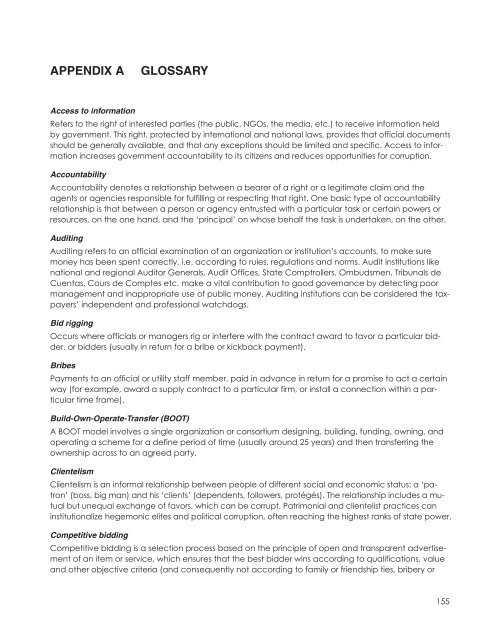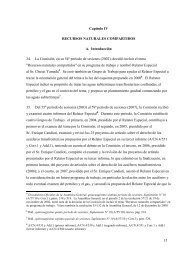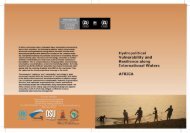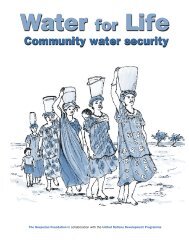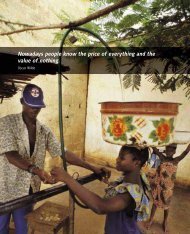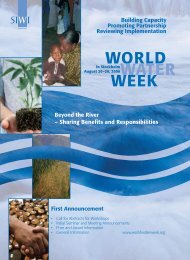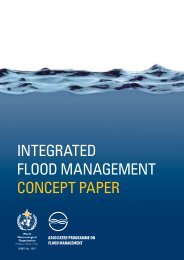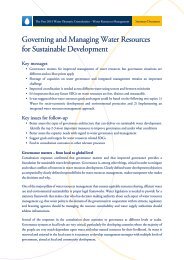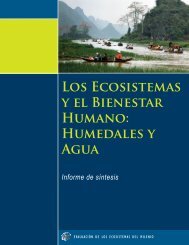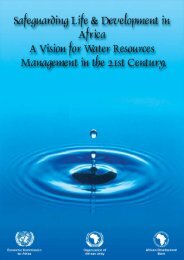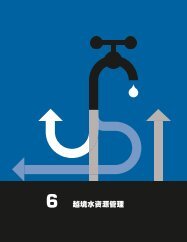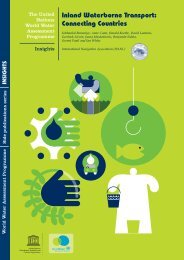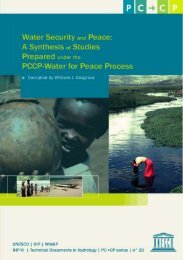A Sourcebook - UN-Water
A Sourcebook - UN-Water
A Sourcebook - UN-Water
Create successful ePaper yourself
Turn your PDF publications into a flip-book with our unique Google optimized e-Paper software.
APPENDIX A<br />
GLOSSARY<br />
Access to information<br />
Refers to the right of interested parties (the public, NGOs, the media, etc.) to receive information held<br />
by government. This right, protected by international and national laws, provides that official documents<br />
should be generally available, and that any exceptions should be limited and specific. Access to information<br />
increases government accountability to its citizens and reduces opportunities for corruption.<br />
Accountability<br />
Accountability denotes a relationship between a bearer of a right or a legitimate claim and the<br />
agents or agencies responsible for fulfilling or respecting that right. One basic type of accountability<br />
relationship is that between a person or agency entrusted with a particular task or certain powers or<br />
resources, on the one hand, and the ‘principal’ on whose behalf the task is undertaken, on the other.<br />
Auditing<br />
Auditing refers to an official examination of an organization or institution’s accounts, to make sure<br />
money has been spent correctly, i.e. according to rules, regulations and norms. Audit institutions like<br />
national and regional Auditor Generals, Audit Offices, State Comptrollers, Ombudsmen, Tribunals de<br />
Cuentas, Cours de Comptes etc. make a vital contribution to good governance by detecting poor<br />
management and inappropriate use of public money. Auditing institutions can be considered the taxpayers’<br />
independent and professional watchdogs.<br />
Bid rigging<br />
Occurs where officials or managers rig or interfere with the contract award to favor a particular bidder,<br />
or bidders (usually in return for a bribe or kickback payment).<br />
Bribes<br />
Payments to an official or utility staff member, paid in advance in return for a promise to act a certain<br />
way (for example, award a supply contract to a particular firm, or install a connection within a particular<br />
time frame).<br />
Build-Own-Operate-Transfer (BOOT)<br />
A BOOT model involves a single organization or consortium designing, building, funding, owning, and<br />
operating a scheme for a define period of time (usually around 25 years) and then transferring the<br />
ownership across to an agreed party.<br />
Clientelism<br />
Clientelism is an informal relationship between people of different social and economic status: a ‘patron’<br />
(boss, big man) and his ‘clients’ (dependents, followers, protégés). The relationship includes a mutual<br />
but unequal exchange of favors, which can be corrupt. Patrimonial and clientelist practices can<br />
institutionalize hegemonic elites and political corruption, often reaching the highest ranks of state power.<br />
Competitive bidding<br />
Competitive bidding is a selection process based on the principle of open and transparent advertisement<br />
of an item or service, which ensures that the best bidder wins according to qualifications, value<br />
and other objective criteria (and consequently not according to family or friendship ties, bribery or<br />
155


